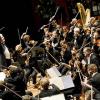Leaderboard
Popular Content
Showing content with the highest reputation on 01/02/2011 in all areas
-
Haha, fair enough ;) You need not explain anything to me. The first minor 3rd is from the F#-Eb (though technically a second) in ms 17. But since the fragmented nature of the groups of notes I had not suspected you could develop that as an idea, like you didn't with the tritone in ms 16 D-Ab. But now, when I look closer I can see your DSCH quote as a development of the sequence in ms 20/21. Interesting hah? how others interpret your work :D1 point
-
1 point
-
1 point
-
I think it's important to make a distinction here. I absolutely agree with Jason's view that the "ability" of the listener to perceive patterns of sound can make the work highly memorable - to the listener, should the listener be interested in the idea. Additionally, the pattern need not sound "traditionally tonal" or what-have-you. It may be entirely practical to look at it from the standpoint of expectations at that point. If the listener expects the work to repeat less, to NOT use tonality, to not sound romantic, classic, et al, then this is also quite amenable in my view. What I take issue with is poorly crafted work, work that does nothing to identify itself or bother to even attempt to connect with a listener. Then, I see this pretentious approach alongside some article discussing how the "art/serious/modern music community needs more support," (see Babbitt, et al) which then goes on to practically "blame" other genres of music for how desperate their plight is... and that, I must say, is offensive to me. It's even more offensive to see some pretentious composer out there take swings at the work of other artists like songwriters and film composers. Quite frankly, if the masses are looking for music and finding something worth listening to in commercial tunes and soundtracks, then I don't see anything wrong with it. If you are composing to put your name into the history books (and this is entirely my opinion), you better be able to incorporate what it is that the masses are seeking. From an Anthropological view of it (and Jason, dispute this if you think it's entirely invalid), the music we study today was the music that, perhaps, "revealed" social trends of the past. In other words, Beethoven wouldn't have been Beethoven if he completely ignored the expectations of the audience. Neither would Mozart. It just so happened that they not only knew what those expectations were, they quite competently manipulated their music to delay resolution of those expectations, using them in a way that almost created its own consonant/dissonant relationship. Here we have these kinds of precedents up until around 1920, but composition studios at the academic level have seen to it that these precedents are avoided at all costs for the sake of staying on the "one and true" path of artistic exploration... teaching many of us to ignore everything else, tunnel our vision, and find our own, unique voice/syntax of music. Sorry, I can't see how we can derive inspiration from a vacuum... we simply MUST be willing to be part of the world if we hope to one day represent something of it in our work, something that connects what we do with our culture, our society, and our perceptions of human civilization at this moment in history collectively (as much as it can be, anyway). We can't do that by ignoring all that precedes us, and we certainly can't expect anyone to listen if we're not doing our part to connect with the world.1 point
-
Hi again, I was just curious about the kind of inspiration that lead your composition process. I've always felt intrigued about how certain composers can make people feel emotions, or even draw pictures into people minds through their music. Say composers as: John Williams,Danny Elfman, much older composers as Dukas, Mahler, Prokofiev or even Beethoven. I feel that eventually your might want to become a film composer, and its quite interesting see how you develop your ideas, or how's your appreciation of music that make you write to like this. Well, yes. I think it is not a bad idea to annotate the feelings that comes along with your musical ideas. Regards,1 point
-
So what IS the Bizarro-academic? Someone who behaves with the exact same elitist/extreme all or nothing mindset that the cliche "ivory tower" academic displays, but applied to a style of music/aesthetic which is contrary to what many academics have obnoxiously tried to push on as what "modern music" should be. The above poster exhibits the typical Bizarro-academic syndrome. NO COMPROMISES, no middle ground. It's all just "ridiculous, random sound," and so on. Throwing trash at a music style, inviting back of course that people throw trash on HIS style as well, I suppose. He says that asking what music is, is a ridiculous question. The great irony of the Bizarro-academic is that they claim to be in for the "high complexity" of "high art," and so on. Yeah, sure! Yet philosophical questions that are the underpinning of what has ALWAYS been music composition (people were fighting about the conception of art during ALL of art history, not just the 20th century. People were asking what "art" was in general, what "music" should be, for centuries and centuries.) The complexity of modern art is due in part for what it's drawing from which is all the centuries of history before it. But beyond giving or not giving explanations as to why something is one way or another it still boils down to something the Bizarro-academic has a fundamental problem working with: The concept that people have different tastes in things. The main characteristic here isn't exactly what kind of music they think or don't think is "real music," "good music," or any of those things, instead it's the interweb-powered way all this comes off extremely elitist. It's this elitism that characterizes it. No middle ground, no compromises and always absolute opinions. While it's fine for people to have opinions, the bizarro-academic must go a step further and actually attack music that opposes their particular tastes, always in a manner as to imply that people who like it are no better than pigs that consume trash. Inviting of course the appropriate "No u" reply. Of course true academics that aren't jerks or incompetent wrecks won't behave this way at all, in part due to having an actual education that didn't cripple them mentally. Plus of course the fact that just saying "academic" means nothing, as from university to university the contrast can be vast and the diversity staggering. But that's why I make clear I'm basing it off a cliche regardless how many people actually fit the cliche or not. It's a bag of LOLs.1 point
-
Also, this is pretty much bullshit. Guess what a large portion of all the big-name composers you've ever heard of did?1 point
-
Thank you, pianoman216. I honestly appreciate the feedback, very much. I response to your comments. Yes, I do use a lot of shifting and inverting within a single chord. Now, it is hard to hear with this electronic recording, but when being performed by a live choir, there is movement occurring. The shifting (with live voices) creates an air of movement in the same harmonic sound blocks, kinda similar to what you might hear in a New Age electronic soundscape. About the crossing/overlap issue, yes they are in there for a reason, actually, for two reasons. First, again with live voices, the sounds of the notes are not as balanced as you hear in this electronic recording, so the sounds which are being sung and the notes that are written is not the same as what the audience hears and experiences. Secondly, each line and voice of this piece was written independently of the others, so each line is it's own "melody", you could say. So when I wrote the piece all of those notes a just the natural flow of each melody as I heard it in my head. The fact that each vocal line is crafted that way makes the performance of the song a lot more enjoyable for the singers, especially the altos and basses. If you can sing, one of the moderators of this forum created a thread for me on putting together a virtual choir to do the World Premiere Performance of this piece on youtube. several of the moderators and members have already volunteered. If you are interested, we would love to have you.1 point
-
Well, anything over a fourth would be considered a leap - particularly for the voice. A cello can easily do a tritone without any concern for intonational issues. And yes, it is interesting how others interpret my work.0 points
-
Translation: This "Bizarro-academic" is the individual who supports and cheers on genres of music that "modern" composers are quite eager to debase as "less" artistic. Yeah, well, to each their own, right? If this was even remotely true of the 20th Century, composition studios the world over would be engaging students in all of those areas upon which modern art supposedly derives its complexity. Instead, students are shuffled into line to hear music that challenges their sensibilities, their interests, their very intuition even. No, modern art has been doing quite the opposite of what you are saying, and Schoenberg was only the beginning of this trend of "abandonment" of the history of music. I'm not even saying Schoenberg actually abandoned history, only that he set a precedent of his own that others then followed to ends that make your final statement patently absurd. Taste is one thing... it is not the end-all-be-all trump card (the bomb in rock/paper/scissors, for example). There is no difficulty, it simply remains that "taste" is assumed in the discussion. We can all have our various flavors of artistic expression and still manage to create with the listener and audience in mind. Absolute opinions... and you'd expect, what, opinions that aren't absolute? Opinions are beliefs, and beliefs are hardly ever "not absolute." Opinions are absolute until someone is given a solid justification or rationale for changing their opinion. Believe it or not, your rant about this cliche "Bizarro-academic" expresses an opinion. Is it absolute? Is it subject to change? Of course not. How utterly deconstructive. Moving on... Of course, this is one person's belief that music without particular aesthetic elements is absurd to them. So what? Right...0 points
-
Obviously a lot of people on the site would agree, including the Bizarro-academics. But that's the entire point of why this is funny.0 points
-
0 points
-
0 points
-
Dude, current pop music > current classical. Between Zorn's little scene in NY, post-rock, and bands like the Books... there's a lot of cool, complex music going about. That's not even the surface, just three of my fascinations.... There needs to be less complaining and more active searching for cool music.0 points
-
When you say "music", are you sure you don't mean "pop music"? There's always been "high art" and "low art" music. As far as the article goes, it's kinda true. Styles beget spin-offs. But then there're always new styles in the so-called "complex" vein. Music isn't dying. And it isn't declining. It's just changing. It always has, it always will.0 points
-
*Tokkemon agrees with Marius Chamberlain His wording is a big pretentious, but the content is agreeable. Music that is getting so dumbed down to the point that it loses any sort of artistic merit is not a good thing. But then again, where's the objective standard to measure this against? Music that is good, just is good.0 points
-
I know I'm gonna get some heat for this, but I actually agree with most of this. Now would I word it this way? Absolutely not. I don't agree with it to the letter, but I do think that as a whole music has progressively gotten simpler and simpler, and not in a good way. The "master musician" of today is required to know very little musical, and pieces of little to no variety is popular now. As far as classical goes, I've never been for the whole "modern movement". IMO it's all just ridiculous, random sound; an attempt to SEEM creative, but really just doing random random garbage and asking ridiculous questions is just that-ridiculous. I'm sorry, but "What is music? What isn't music?" just doesn't hold any weight with me.0 points






